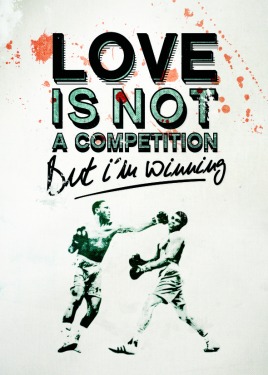In adversarial ethics, we need to be able to differentiate institutions that are adversarial from those that are not. But isn’t competition all around? In any social situation we can imagine there are mutual interests but also competing interests. In some areas like sports, markets, and electoral systems competition is clearly expressed. In others it is not. But that doesn’t mean that it is absent.
There are children competing against each other for the last piece of cake. You may fight against yourself on your daily running track. Even love is a competitive game as ABBA sing in their famous song “The Winner Takes It All”. (Watch the video of the song here.)

The song tells the story of a jilted woman sadly looking back on a love affair and thinking about the new relationship of her ex. The songwriters used the game-metaphor to illustrate the competition in love. The woman in the song is the loser who is “standing small” and “has to fall”. She is the loser in the game against the woman she lost her boyfriend or husband to but also in the game with or against her boyfriend. There is “no more ace to play” – the game is over. Destiny plays a role in that game, too. It is personified by Gods throwing their dice and thereby deciding about the end of that relationship.
ABBA’s song was about the game of love. We don’t know whether they think all human activities are competitive because, well, they really only ever wrote songs about love. But still, doesn’t it seem plausible to believe that competition somehow plays a role in every situation we can imagine? Aren’t we naturally competitive? Isn’t that the reason why we have ethics and moral standards at all? Joseph Heath quotes Kurt Baier who says that being moral means “following rules designed to overrule self-interest whenever it is in the interest of everyone alike that everyone should set aside his interest”. This means, most ethics are there because we cannot all have what we want. They are used to solve collective action problems.
Sure, in some institutions like markets we try to encourage competitive behavior because people or costumers benefit from that competition. In others like a family we want to suppress it – but it is still around. This difference might be the most important distinction between adversarial and non-adversarial institutions. This means, in non-adversarial contexts (family, love etc.) we try to live by the principles of cooperation and even altruism. In adversarial institutions (markets, elections, sports etc.), however, moral ideals that are relevant in non-adversarial settings are forbidden. For example, cooperation between competitors might lead to price fixing. We justify the abandonment of these ideals in competitions by the benefits for the people who are not competing (the customers). The difference is thus different ethical and moral ideals.
Filed under: deliberately adversarial institutions, ethics, everyday ethics, non-adversarial institutions

















